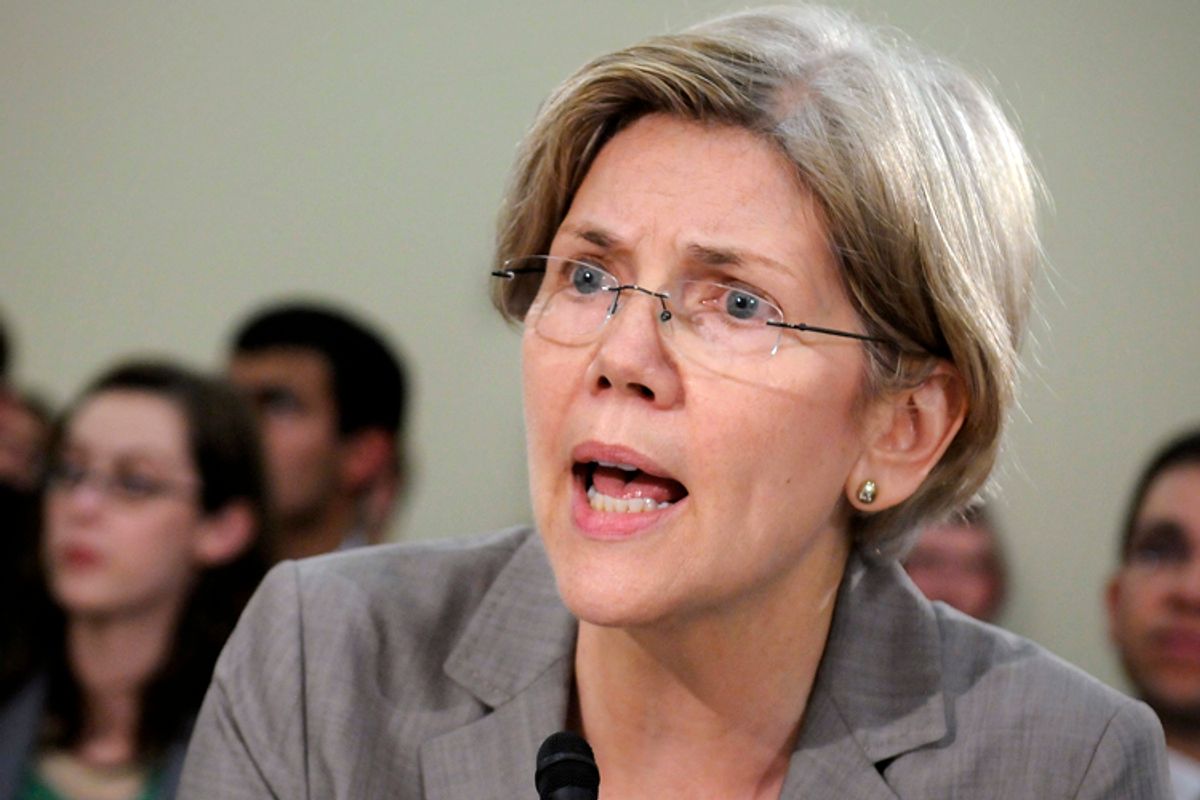Massachusetts Senator Elizabeth Warren just further burnished her progressive credentials with a thorough and explicit telling of racial injustice in America, focusing on what she called three tools of oppression historically and currently used against African-Americans and concluding with a full-throated endorsement of the Black Lives Matter movement.
"Violence, voting, economic justice," Warren told the Edward M. Kennedy Institute for the United States Senate on Sunday, were and are state-sanctioned "tools of oppression" used against African-Americans. Warren detailed what she described as the "dark underbelly" of "how America built a great middle class":
Entire legal structures were created to prevent African Americans from building economic security through home ownership. Legally-enforced segregation. Restrictive deeds. Redlining. Land contracts. Coming out of the Great Depression, America built a middle class, but systematic discrimination kept most African-American families from being part of it.
State-sanctioned discrimination wasn't limited to homeownership. The government enforced discrimination in public accommodations, discrimination in schools, discrimination in credit-it was a long and spiteful list.
Turning to today's racial struggle, Warren credited the civil rights legislation of the 1960s with widely establishing the founding principle of the current protest movement. "The first civil rights battles were hard fought. But they established that Black Lives Matter," Warren said. “These laws made three powerful declarations: Black lives matter. Black citizens matter. Black families matter,” she argued, crediting her predecessor, the late Sen. Ted Kennedy, with helping to shepherd the landmark legislation through Congress.
Still, housing discrimination, Warren reminded the audience, is "alive and well in 2015," noting recent multi-million dollar settlements by banks who illegal charged a so-called "racial surtax" for home mortgages.
Warren squarely laid blame for the economic failures of the civil rights movement at the feet of Republican economic theory:
Research shows that the legal changes in the civil rights era created new employment and housing opportunities. In the 1960s and the 1970s, African-American men and women began to close the wage gap with white workers, giving millions of black families hope that they might build real wealth.
But then, Republicans' trickle-down economic theory arrived. Just as this country was taking the first steps toward economic justice, the Republicans pushed a theory that meant helping the richest people and the most powerful corporations get richer and more powerful. I'll just do one statistic on this: From 1980 to 2012, GDP continued to rise, but how much of the income growth went to the 90% of America - everyone outside the top 10% - black, white, Latino? None. Zero. Nothing. 100% of all the new income produced in this country over the past 30 years has gone to the top ten percent.
Today, 90% of Americans see no real wage growth. For African-Americans, who were so far behind earlier in the 20th Century, this means that since the 1980s they have been hit particularly hard. In January of this year, African-American unemployment was 10.3% - more than twice the rate of white unemployment. And, after beginning to make progress during the civil rights era to close the wealth gap between black and white families, in the 1980s the wealth gap exploded, so that from 1984 to 2009, the wealth gap between black and white families tripled
Warren also called out the "five conservative justices on the Supreme Court" whom she argued "gutted the Voting Rights Act, opening the floodgates ever wider for measures designed to suppress minority voting":
Today, the specific tools of oppression have changed-voter ID laws, racial gerrymandering, and mass disfranchisement through a criminal justice system that disproportionately incarcerates black citizens. The tools have changed, but black voters are still deliberately cut out of the political process.
But, Warren argued, "economic justice is not - and has never been - sufficient to ensure racial justice," admitting to the fallibility of her populist rhetoric if it lacks equally weighty measures to combat racial inequality:
Owning a home won't stop someone from burning a cross on the front lawn. Admission to a school won't prevent a beating on the sidewalk outside. But when Dr. King led hundreds of thousands of people to march on Washington, he talked about an end to violence, access to voting AND economic opportunity. As Dr. King once wrote, "the inseparable twin of racial injustice was economic injustice."
Warren then implored White America to listen to the concerns of African-Americans on the issue of police brutality and over-criminalization, arguing that their "pervasive and persistent distrust isn't based on myths. It is grounded in the reality of unjustified violence":
Listen to the brave, powerful voices of today's new generation of civil rights leaders. Incredible voices. Listen to them say: "If I die in police custody, know that I did not commit suicide." Watch them march through the streets, "hands up don't shoot" - not to incite a riot, but to fight for their lives. To fight for their lives.
This is the reality all of us must confront, as uncomfortable and ugly as that reality may be. It comes to us to once again affirm that black lives matter, that black citizens matter, that black families matter.
The reaction to Warren's speech by Black Lives Matter activists has been positive. Prominent activist DeRay McKesson praised Warren as better than any other politician on her understanding "that the American dream has been sustained by an intentional violence and that the uprisings have been the result of years of lived trauma."
"Senator Warren's speech clearly and powerfully calls into question America's commitment to black lives by highlighting the role that structural racism has played and continues to play with regard to housing discrimination and voting rights," Mckesson told the Washington Post.
Watch Warren's full address to the Edward M. Kennedy Institute for the United States Senate and read her full text here:
(H/T: Huffington Post)


Shares